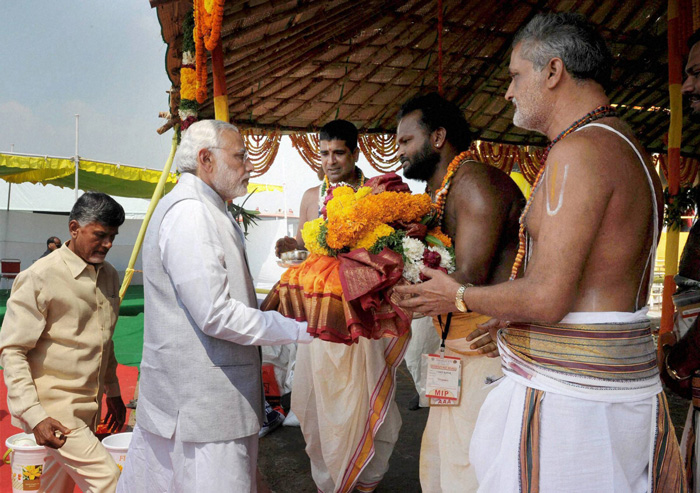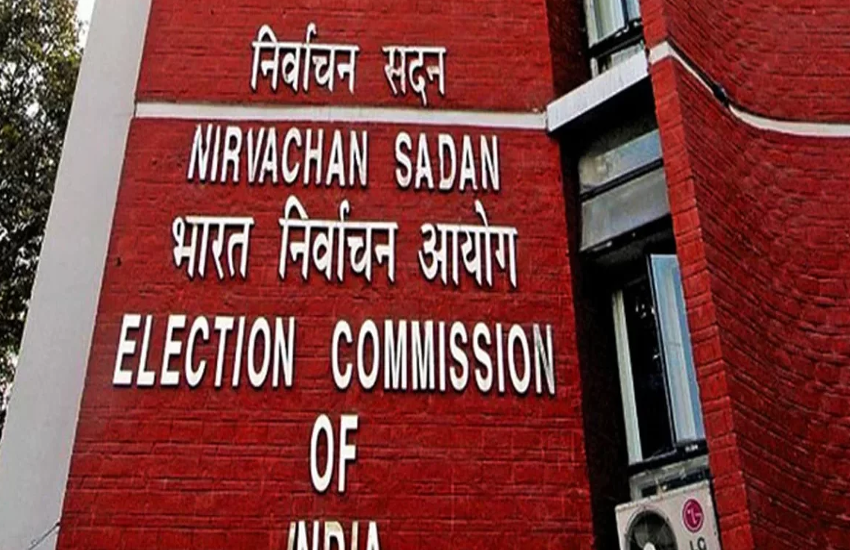
In a grand ceremony, Prime Minister Narendra Modi laid the foundation stone for Andhra Pradesh's new capital city Amaravati at a village in Guntur district today. A dream project of Chief Minister N Chandrababu Naidu of the Telugu Desam Party, Amravati is touted to be a world-class smart city, where four million people would eventually reside.
The State government has, reportedly, acquired 32,000 acres of land from the farmers for the mega project. The government is also pitching it as a spectacular example of land-pooling mechanism as a model that can be adopted by other states and Central government agencies.
Master-plan of Amravati released by Andra Pradesh govt.
But the mode of land acquisition for the city is being questioned. A number of farmers and civil society activists are upset with the mechanism through which the land has been acquired. Further, there are a number of other concerns which seem to be puncturing the hoopla around this grand project.
1) The mode of acquisition and criteria of compensation
Land pooling - entails landowners handing over ownership rights to a government agency. The agency then develops the civic infrastructure and returns a portion of land to the owner, who now possess land that has become considerably more valuable thanks to development.
The government is said to have provided a handsome compensation to the farmers in the return of their land, a deal which it claims creates 'win-win' situation for both the farmers and the project developers. Under the compensation, the government has promised to give over 25 per cent of developed land to original owners.

Photo: PTI
The 31,000 acres of land has been acquired from 18,000 farmers by committing an annuity of Rs 50,000 per acre for 10 years. Simultaneously, the farmers get back 1,250 sq yards of residential plot and a commercial plot of 200 sq yards in the new city for every acre. The catch, as experts have pointed out, is that the government has not specified where they will be given these plots of land.
EAS Sarma, former secretary in the Ministry of Finance has a different story to tell."The land pooling approach adopted by the State has robbed the farmers of their legitimate right to demand prior compensation and rehabilitation," claims Sarma.
He also alleges that the acquisition has indirectly facilitated the lands slipping away into the hands of several unethical real estate land grabbers who have made huge unaccounted for profits.
In his reports, Sarma mentions that the land acquisition done under the Andra Pradesh Capital Region Development Authority, happened at supressed values in specific villages Guntur and Krishna districts.
Further, B Ramakrishnam Raju, the national convenor of National Allaince of People's movement, points out the ambiguity around the compensation. "There is no clarity on where the farmers will get the compensatory land. Will it be in the capital, close to it or far away," says Raju.
The activists are also demanding an assurance from the government that owners and farmers get appropriate prices for their compensatory land if they plan to sell them in future.
Modi recited a Telugu peom during the lauch of Amaravti.
2) Loss of fertile agricultural land
Sarma, in a letter to the Union Ministry of Environment and Forests, claimed that the Andhra Pradesh government is violating an interim order issued on 10 October, by the National Green Tribunal restraining it from going ahead with the new city project until it obtains statutory environmental clearances.
The letter, which was sent on 16 October, also asserts that rules have not been followed while acquiring fertile agricultural land and wetlands which actually comprise nearly 40 per cent of the total area acquired by the government. The area is highly fertile and houses a number of crops varieties. Sarma, in the letter, has also accused the government of hastily acquiring the environmental clearances without following proper environmental norms.
3) Social factors on back burner
Activists like Sarma and Raju are fearing that since the state government is under acute debt, the capital required for the city will be compensated by making a cut in the development budget which will adversely impact the backward areas in the state.

Photo: A concept of Amaravati city. Photo: Screengrab
4) The concerns of labourers and tenant farmers
There is still no clarification on the livelihoods of labourers who used to work on the agricultural land that has now been acquired by the government. Further, for the tenants farmers, the construction of the city has been a bolt from the blue.
Also, tenants farmers are reportedly the worst hit as they used to earn just about enough to support their families from the leased land they farmed on. Since there is no land for leasing now, they are left with no source of income.
5) A 'win-win' situation for all or for only TDP
Raju alleges that Naidu advised his party members to purchase lands close to the city before the construction began. "They were aware that land prices will shoot up once the city is in place, so they spared no time in acquiring land from which they can reap benefits later," says Raju.



![BJP's Kapil Mishra recreates Shankar Mahadevan’s ‘Breathless’ song to highlight Delhi pollution [WATCH] BJP's Kapil Mishra recreates Shankar Mahadevan’s ‘Breathless’ song to highlight Delhi pollution [WATCH]](https://images.catchnews.com/upload/2022/11/03/kapil-mishra_240884_300x172.png)

![Anupam Kher shares pictures of his toned body on 67th birthday [MUST SEE] Anupam Kher shares pictures of his toned body on 67th birthday [MUST SEE]](https://images.catchnews.com/upload/2022/03/07/Anupam_kher_231145_300x172.jpg)






